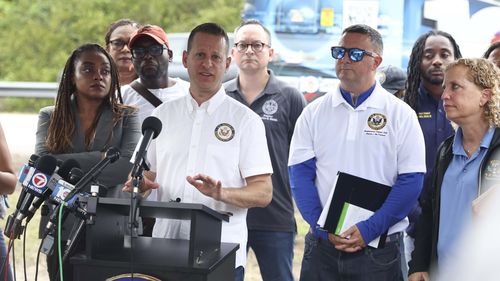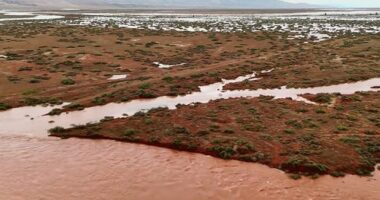Share this @internewscast.com
Amidst the perilous and environmentally sensitive Everglades in the United States, a large number of migrants are held within a temporary tent detention center. This facility, which Florida’s Republican governor describes as “safe and secure,” is criticized by Democratic lawmakers as “inhumane.”

Following a lawsuit challenging Florida Governor Ron DeSantis for allegedly refusing entry to inspect the conditions at what is known as “Alligator Alcatraz,” members of Congress and state officials were eventually allowed a brief tour. They had initially criticized the restricted access as a “deliberate obstruction meant to hide what’s really happening behind those gates,” as expressed in a unified statement by the lawmakers.
During their visit, lawmakers reported hearing detainees pleading for help and shouting “libertad,” or “freedom” in Spanish, while enduring intense heat, pest infestations, and inadequate food. “They are essentially packed into cages, wall-to-wall humans, with 32 detainees per cage,” explained Rep. Debbie Wasserman Schultz, a representative for Florida’s 25th Congressional District, during a press briefing after their inspection.
The families of some of the detainees have also decried conditions in the facility, while Immigration and Customs Enforcement officials defend it as offering higher detention standards than many US prisons.
Lawmakers shown empty cells

On the tour, the lawmakers said they were not allowed to visit areas where migrants are currently being detained but instead were shown cells not yet being used.
Wasserman Schultz said each cage contained three small toilets with attached sinks, which detainees use for drinking water and brushing their teeth, sharing the same water used to flush the toilets.
When they toured the kitchen area, Wasserman Schultz said government employees were being offered large pieces of roast chicken and sausages, while the detainees’ lunch consisted of a “grey turkey and cheese sandwich, an apple and chips.”
“I don’t see how that could possibly sustain them nutritionally or not make them hungry,” Wasserman Schultz said. “And when you have hungry people, obviously their mood changes.”
Rep. Maxwell Alejandro Frost, who was also on the tour, said the lawmakers were concerned about reports of unhygienic conditions due to toilets not working and “faeces being spread everywhere,” but were denied access from viewing units where migrants are currently detained.

They were also not permitted to view the medical facilities, with officials citing HIPAA laws, despite lawmakers being allowed to examine the medical facilities at other detention facilities, he said.
“It is something everyone, whether you’re Democrat, Republican or anything, should be deeply ashamed of,” Frost said.
“Immigrants don’t poison the blood of this nation. They are the blood of this nation.”
US Rep. Darren Soto said lawmakers also witnessed evidence of flooding, highlighting serious concerns of what could happen to detainees if there’s severe weather during what forecasters said may be a busy hurricane season.
“What we saw in our inspection today was a political stunt, dangerous and wasteful,” Soto said after the tour.
“One can’t help but understand and conclude that this is a total cruel political stunt meant to have a spectacle of political theatre and it’s wasting taxpayer dollars and putting our ICE agents, our troops and ICE detainees in jeopardy.”

Student nurse survived night of horror because serial killer lost count
Detained migrant’s family reports difficult conditions, no access to lawyer
About 900 people are currently detained at the facility, Wasserman Schultz said during the news conference but it has the capacity to hold 3,000 people, with room for more, according to Kevin Guthrie, executive director of the Florida Division of Emergency Management.
The wife of a 43-year-old Guatemalan man currently detained at “Alligator Alcatraz” told CNN her husband is enduring harsh conditions similar to those described by lawmakers who toured the facility.

After more than two weeks in detention, she said, he has yet to see a lawyer.
“There are too many mosquitoes ⦠He’s in a really bad condition.
The power goes off at times because they’re using generators,” the woman told CNN in an interview on Tuesday.
“The detainees are being held in tents, and it is very hot there. They’re in bad conditions. ⦠There’s not enough food. Sick people are not getting medication. Every time I ask about his situation, he tells me it’s bad,” she said.
The Guatemalan woman said she, her husband, and their 11-month-old baby went fishing on June 25 in the Everglades.
A Florida wildlife officer approached them and asked for documents.
Her husband had a valid driver’s license, she said, but when the officer realized she didn’t have any documents proving she was in the country legally, the officer called immigration authorities who detained the whole family.
After spending seven-and-a-half hours in what she describes as a “dirty holding cell,” she and her baby â a US citizen â were released, but her husband was detained. She now wears an ankle bracelet.
Her husband later told her he remained in detention at the Dania Beach Jail, near Fort Lauderdale, for eight days, before being transferred to “Alligator Alcatraz.”
Once transferred, he was unable to take a shower for six days and there were not enough facilities for washing hands, she said.
On Friday, he was woken up at 3am to take a shower because of the number of people waiting for their turn, she said.
The Department of Homeland Security, which oversees the Florida detention facility, did not immediately reply to CNN’s request for comment about specific allegations about conditions there.
‘Alligator Alcatraz’ set up in just eight days
In little over a week, workers transformed the Dade-Collier Training and Transition Airport from an 11,000-foot runway into a temporary tent city President Donald Trump toured last week.

Trump raved about the facility’s “incredible” quick construction during his visit and pointed to the detention centre as an example of what he wants to implement “in many states.”
The project was fast-tracked under an executive order from DeSantis, who framed illegal immigration as a state emergency.














